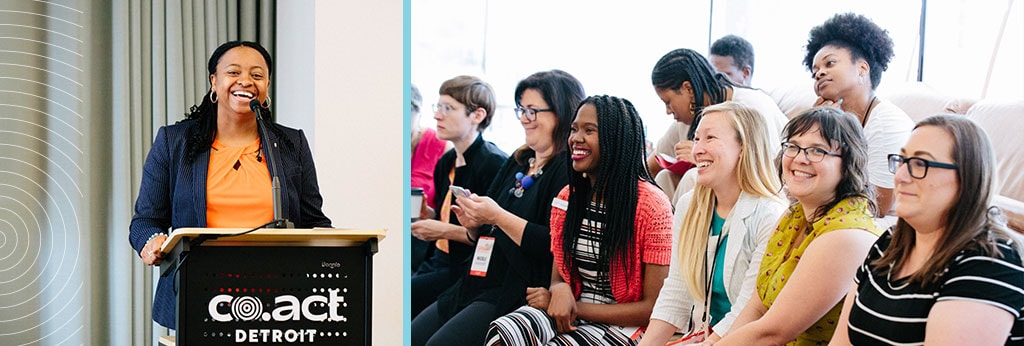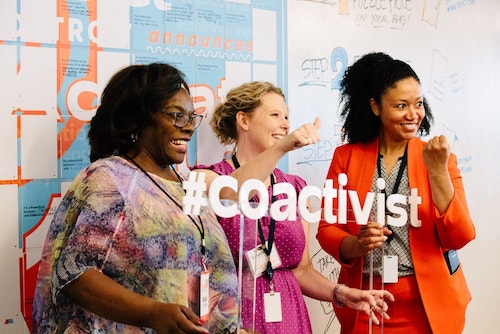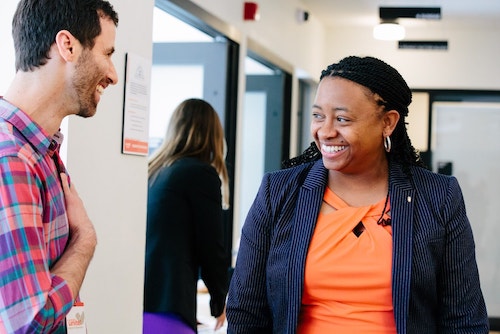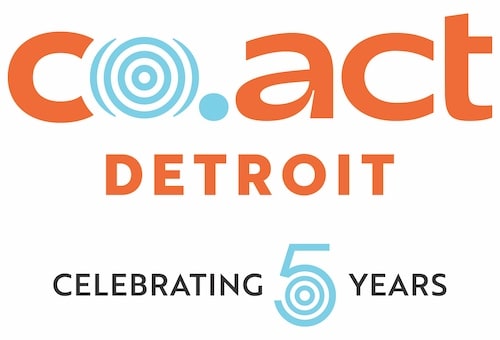On the Co.act-related question she wishes she was asked more often:
“What are you learning?” is one question that I wish people would ask more often. Through success and failure, we are learning where the biggest opportunities exist to respond to the needs of nonprofits and plant seeds for culture change in the sector. We are listening deeply and exploring next practices that encourage sustained transformation.

On emergence:
I’ve been in this sector, in this region, my entire professional career. And every day, I learn about something new that’s happening. My time at Co.act has really reinforced for me the value of being a lifelong learner. For our team, there’s an unconventional level of adaptability we have to have. We are always thinking about the value of improvisation; the ability to be responsive in the moment, the ability to see different perspectives, the ability to be okay with pivoting. We may move down a road on a program or an idea and realize that there’s a different approach, or there’s something that works better, and we’ve got to be willing to relinquish that path to try something different when necessary. In order to address complex challenges and systems, we must be able to adapt, respond and influence.
That is my hope — that Co.act evolves into something we can’t possibly imagine. There’s such value in emergence, in us not having this static idea about what this all should be. What’s most important to me — regardless of what the form and structure looks like — is that nonprofits and their leaders are getting connected to the resources they need. The form in which that happens can be completely different for each organization, but at the end of the day, that’s what’s most important, because it’s that work that’s going to help move the needle on the problems we have in our community.
On balancing the desire for radical, systemic change within an institution which relies on cultivating trust among a diverse range of stakeholders:
Trust is necessary to facilitate radical, systemic change. We don’t get there without trust, the inclusion of diverse perspectives and strong relationships. At Co.act, we consistently think about the avenues through which we can facilitate and engage in collaborative efforts where we can add value.
We think about our work using a metaphor of a three-legged stool. The first leg is the space itself: it’s one of the few places that nonprofits in our community can point to and say, “That’s for me.” Or, can point to and say, at a bare minimum, “I can start there.” One of our greatest value adds is our ability to help lift up some of the many amazing things that are happening in our region. So, the space is the first leg of that stool.
 The second leg of the stool is the idea of a more resilient and more connected non-profit community in our region. There are amazing organizations doing amazing work, but it’s often within silos. We think of our role as bending those silos to create pipelines. So, there’s that piece of it, and I think we’ll find over time that one of our greatest value adds is in lifting up and connecting resources and services for nonprofits.
The second leg of the stool is the idea of a more resilient and more connected non-profit community in our region. There are amazing organizations doing amazing work, but it’s often within silos. We think of our role as bending those silos to create pipelines. So, there’s that piece of it, and I think we’ll find over time that one of our greatest value adds is in lifting up and connecting resources and services for nonprofits.
The third leg is through customizable programs and services that meet nonprofits where they are. The nonprofit community is so diverse. Organizations tackle all kinds of issues and challenges, but they also look very different —from the organization which has five volunteers to the one that’s been around for five decades and has five divisions. We have to be responsive to this range of needs, so we think a lot about how we meet nonprofits where they are. I like to think about it as having multiple on-ramps for different types of organizations.
On the role of self-care in the Co.act space and in the non-profit community:
The idea of self-care at Co.act emerged from two places:
First, my leadership journey is one in which I try to practice and model self-care. I am most able to serve our mission when my habits and behaviors are reflective of wholeness and wellness. I check in with myself regularly. During the interview process for our team, we asked each candidate: “How do you practice self-care?” This question really surprised people — but the wellbeing of our team is something we really value.
 Second, the last year has been about listening and understanding the biggest opportunities for Co.act to add value to the sector. We did a lot of listening. I did a lot of listening — even outside of the formal engagement sessions and surveys. The need to elevate the value of self-care was a consistent theme. This work is often tireless in nature, connected to the heartstrings, to passion and purpose, and people work really hard, because we care so much. What that means is that often, we neglect ourselves. In addition, nonprofit leaders are often working on these really complex issues in our communities and we’re internalizing them. We’re experiencing trauma on a daily basis, and it has to go somewhere. So, for me, in order to be an effective leader, in order to have a high performing, effective organization, I am intentional about unpacking that and taking care of myself. And, I encourage the same of my team. It’s like the analogy of, “You can’t pour from an empty cup.” You fill yourself up, and you give from the overflow. For us, again, it’s another way build the culture and lift up our values.
Second, the last year has been about listening and understanding the biggest opportunities for Co.act to add value to the sector. We did a lot of listening. I did a lot of listening — even outside of the formal engagement sessions and surveys. The need to elevate the value of self-care was a consistent theme. This work is often tireless in nature, connected to the heartstrings, to passion and purpose, and people work really hard, because we care so much. What that means is that often, we neglect ourselves. In addition, nonprofit leaders are often working on these really complex issues in our communities and we’re internalizing them. We’re experiencing trauma on a daily basis, and it has to go somewhere. So, for me, in order to be an effective leader, in order to have a high performing, effective organization, I am intentional about unpacking that and taking care of myself. And, I encourage the same of my team. It’s like the analogy of, “You can’t pour from an empty cup.” You fill yourself up, and you give from the overflow. For us, again, it’s another way build the culture and lift up our values.
On what excites her most about the future of Co.act:
I am excited to build and work with the tapped and untapped brilliance of our region to identify solutions to our most pressing challenges. There are so many amazing leaders and organizations engaging in meaningful work in Southeast Michigan. I truly believe we are better together and our greatest opportunity for transformation lies in our collaborative efforts and abundance mindset.
I am also excited about the Co.act team! Now that Co.act has launched, I am excited to witness and support the ways in which their talents, passions, interests and sense of responsibility translate into real positive change for our community.
